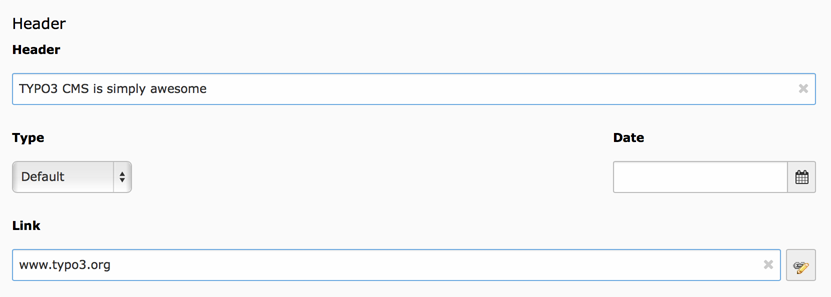The content elements¶
This chapter will describe the basic set of content elements provided by the TYPO3 CMS core. It will show you a description, screenshots of the backend fields and a screenshot of the frontend rendering, only styled with the basic styling provided by the static template “Content Elements CSS (optional) (fluid_styled_content)” described in chapter Using the rendering definitions.
The screenshots of the fields are made with the extension configuration option “Show only a minimum set of editing fields” SET TO OFF as described in chapter Configuration.
General fields¶
These are fields which are used by (almost) every content element.
Header¶

The header fields
Almost every content element can contain a header, which consists of the following parts:
- Header
- The text of the header
- Type
- The type of heading (heading 1, heading 2, heading 3 … or if the header is hidden). When not choosing an option, the default heading will be used, which can be configured at Constant Editor.
- Date
- Have the possibility to group the header with a date
- Link
- Link wrapping the header text. This can be a TYPO3 CMS page, an external page, an email address or a link to a file.
The header fields can be found in the “General” tab of a content element.

Frontend rendering of a linked header with a date
Append with Link to Top of Page¶

The field “Append with link to top of page”
When checked, this will render a link below the content element to bring the visitor the top of the page. This will be very convenient for your visitors when having long pages.

Frontend rendering of the To Top link
Access¶

The Access tab with all its fields
These fields define if and when a visitor has access to this content element. The access fields all reside in the Access tab:
- Visibility of content element
- By checking this option the content element will not be visible to any visitor.
- Publish Date
- The date on which the content has to be published, which means making visible at a certain date.
- Expiration Date
- The date on which the content will be expired, which means the content will be hidden on a certain date
- Usergroup Access Rights
- Here you can select whether the content element only is available to a certain frontend user group, if it has to be visible only when the visitor is logged in or if it has to be hidden at a login.

